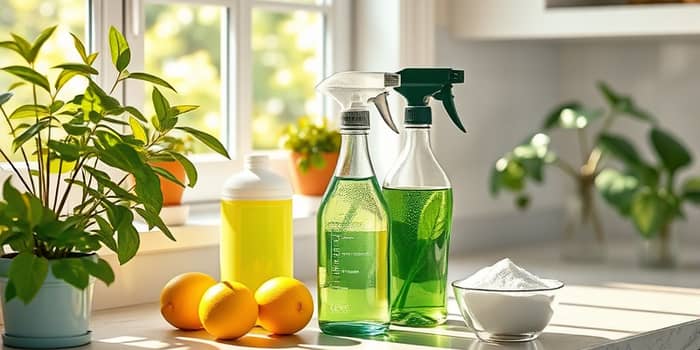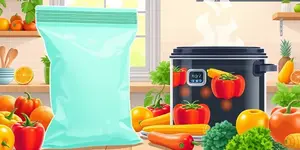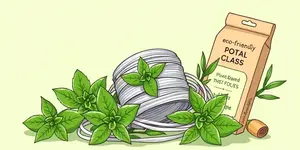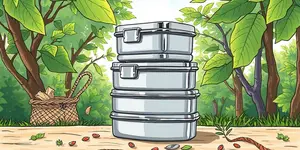In a world increasingly concerned about health and the environment, the choice between chemical and natural cleaning solutions has never been more critical. Many households are discovering that nature’s pantry offers powerful alternatives to store-bought chemical cleaners.
This article explores how simple ingredients sourced from plants and minerals can deliver exceptional cleaning power without toxins, safeguarding your family and the planet.
Understanding All-Natural Cleaners
All-natural cleaners rely on ingredients derived from nature—vinegar, baking soda, lemon juice, essential oils, and naturally derived surfactants. Unlike their synthetic counterparts, these products are formulated to be biodegradable and non-toxic residues after use.
It’s important to note that “all-natural” does not mean “chemical-free.” Everything in nature is composed of chemicals, but natural cleaners avoid harsh, artificial compounds like chlorine bleach or ammonia derivatives. By choosing ingredients that break down harmlessly, you protect indoor air quality and reduce environmental impact.
Exceptional Performance vs. Harsh Chemicals
Many assume that chemical cleaners are always superior. Yet research and real-world tests show that plant-based ingredients can match or exceed performance on everyday tasks. Ingredients like vinegar (with approximately 5% acetic acid) and baking soda act as potent disinfectants, deodorizers, degreasers, and mild abrasives.
While certain industrial-grade jobs may benefit from concentrated chemical agents, most household chores can be handled by well-formulated natural solutions. Studies of brands such as Mrs. Meyer’s and Seventh Generation demonstrate germ-killing power comparable to commercial disinfectants under normal conditions.
In practice, you may need a bit more elbow grease or a longer dwell time compared to aggressive chemicals, but the result is equally hygienic and far safer for daily use.
Health and Safety Benefits
Exposure to harsh chemical cleaners has been linked to respiratory irritation, allergies, and even long-term health risks like asthma. Volatile organic compounds (VOCs) released by products containing ammonia or bleach can aggravate lungs, especially in children, pets, and sensitive individuals.
Natural cleaners:
- Release few to zero airborne irritants when applied
- Are gentle on skin and eyes, minimizing accidental injuries
- Leave safer residues on countertops, floors, and fabrics
By switching to natural formulations, households can dramatically reduce indoor air pollution and create a nurturing environment for every member of the family.
Environmental Impact and Sustainability
Chemical cleaners often wash down drains and enter waterways, contributing to aquatic toxicity and long-term ecological harm. In contrast, plant- and mineral-based formulas are inherently biodegradable, breaking down into harmless compounds.
DIY solutions further reduce plastic waste by allowing you to reuse containers and purchase ingredients in bulk. Embracing natural cleaners helps you cultivate a zero-waste cleaning routine that benefits both home and planet.
DIY Recipes and Store-Bought Solutions
One of the most empowering aspects of natural cleaning is how easy and affordable it can be. Below are some simple recipes to try at home:
- All-Purpose Spray: Mix equal parts white vinegar and water, add a few drops of tea tree essential oil for extra antimicrobial action.
- Heavy-Duty Scrub: Combine baking soda with just enough water to form a paste—ideal for stovetops and sinks.
- Glass and Mirror Cleaner: Blend water, rubbing alcohol, and a dash of vinegar for streak-free shine.
For those who prefer ready-made products, look for certifications like USDA BioPreferred, Ecocert, or Green Seal. Check ingredient lists for familiar components and avoid hidden synthetic fragrances or surfactants.
Debunking Misconceptions and Labels
“Greenwashing” is real. Not every product labeled “natural” or “eco-friendly” meets rigorous standards. To ensure authenticity:
- Scrutinize the ingredient list—ingredients should be recognizable from your kitchen pantry.
- Verify third-party certifications and read label fine print.
- Beware of buzzwords like “bio” or “organic” without supporting evidence.
Understanding labeling nuances empowers you to make informed purchases and avoid overrated solutions.
Practical Tips for Transitioning
Switching to all-natural cleaners can be seamless if you follow a few guidelines:
- Start gradually: Replace one chemical product at a time to gauge effectiveness.
- Test new solutions in inconspicuous areas to confirm compatibility.
- Store ingredients in clearly labeled containers for safety.
- Keep microfiber cloths and reusable scrubbers on hand to maximize cleaning efficiency.
By taking a measured approach, you’ll build confidence in natural cleaners and reduce reliance on harsh chemicals over time.
Embracing all-natural cleaning solutions is more than a trend—it’s a commitment to health, sustainability, and mindful living. With minimal effort and simple ingredients, you can achieve a sparkling clean home without sacrificing safety or environmental responsibility.
References
- https://www.helixsolutions.net.au/news-and-resources/article/what-cleans-better-chemical-or-natural-cleaning-products
- https://simplelivingeco.com/blogs/simple-living-eco-blog/natural-cleaning-products-vs-chemical-cleaning-products-what-s-the-difference
- https://solicleaning.com/natural-vs-chemical-cleaners-which-is-better-for-your-home/
- https://www.americastestkitchen.com/articles/7268-is-your-natural-cleaner-even-doing-anything
- https://getuhoo.com/blog/home/chemical-cleaners-vs-natural-cleaners-impact-on-indoor-air-quality/
- https://batteryuniversity.com/article/bu-808-how-to-prolong-lithium-based-batteries
- https://herbalstrategi.com/blogs/blog/natural-cleaners-vs-chemical-cleaners










